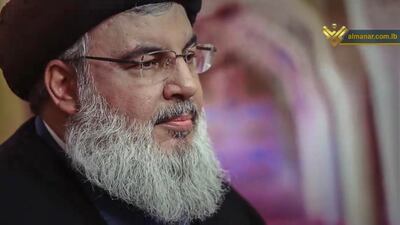Israel spared Hezbollah operatives during a recent attack in Syria to avoid causing all-out regional war, said the Lebanese group’s leader Hassan Nasrallah in a radio interview on Tuesday evening.
“Israel could have killed the men. It did not make a mistake,” said Mr Nasrallah, referring to an incident that occurred on April 15, when an Israeli drone targeted a car carrying three Hezbollah members near Syria’s border with Lebanon. Thanks to a warning strike, the men fled the car, which was then directly hit by a second strike.
The Hezbollah leader explained that Israel adopted a warning strategy out of fear of escalation. “If they kill our men in Syria or Lebanon, we will respond,” he said.
Mr Nasrallah’s explanation confirmed earlier media reports alleging that Israel refrains from killing Hezbollah members operating in Syria, though it targets Iranians or members of allied groups. Hezbollah, a longtime ally of Syria, sent thousands of fighters to back the Syrian government in 2012.
Quoting an anonymous source, the New York Times reported late in April that Israeli strikes in Syria have killed only 16 Hezbollah operatives since 2013, compared to hundreds of Iranians, Syrians and Iraqis that also support Damascus militarily.
Israel has avoided targeting Iran-backed Hezbollah in its home country, Lebanon, since a month-long war in 2006 between the two camps that killed over 1,200 people.
Tensions soared again last summer, when two Israeli drones exploded in a Hezbollah stronghold in South Beirut, causing material damage but no casualties. Hezbollah retaliated with a cross-border attack a few weeks later, but no-one was killed.
In his interview with Hezbollah-affiliated radio Al Nour on Tuesday, Mr Nasrallah said that his group did not respond to Israel from inside Syria to avoid a regional war that Damasus, which is still struggling with a near decade-long civil war, could not cope with.
“It’s not in Syria’s interest, while it is fighting an existential war against terrorism, to be enticed into a war with Israel,” said Mr Nasrallah.
"Syria is in between priorities. There is a battle that it did not finish inside Syria against takfiri (Muslim apostates), terrorism, and groups that are waiting for an opportunity in Syria to rise again. So the battle is not over yet… Syria needs time," added Mr Nasrallah. "We must have strategic patience."


